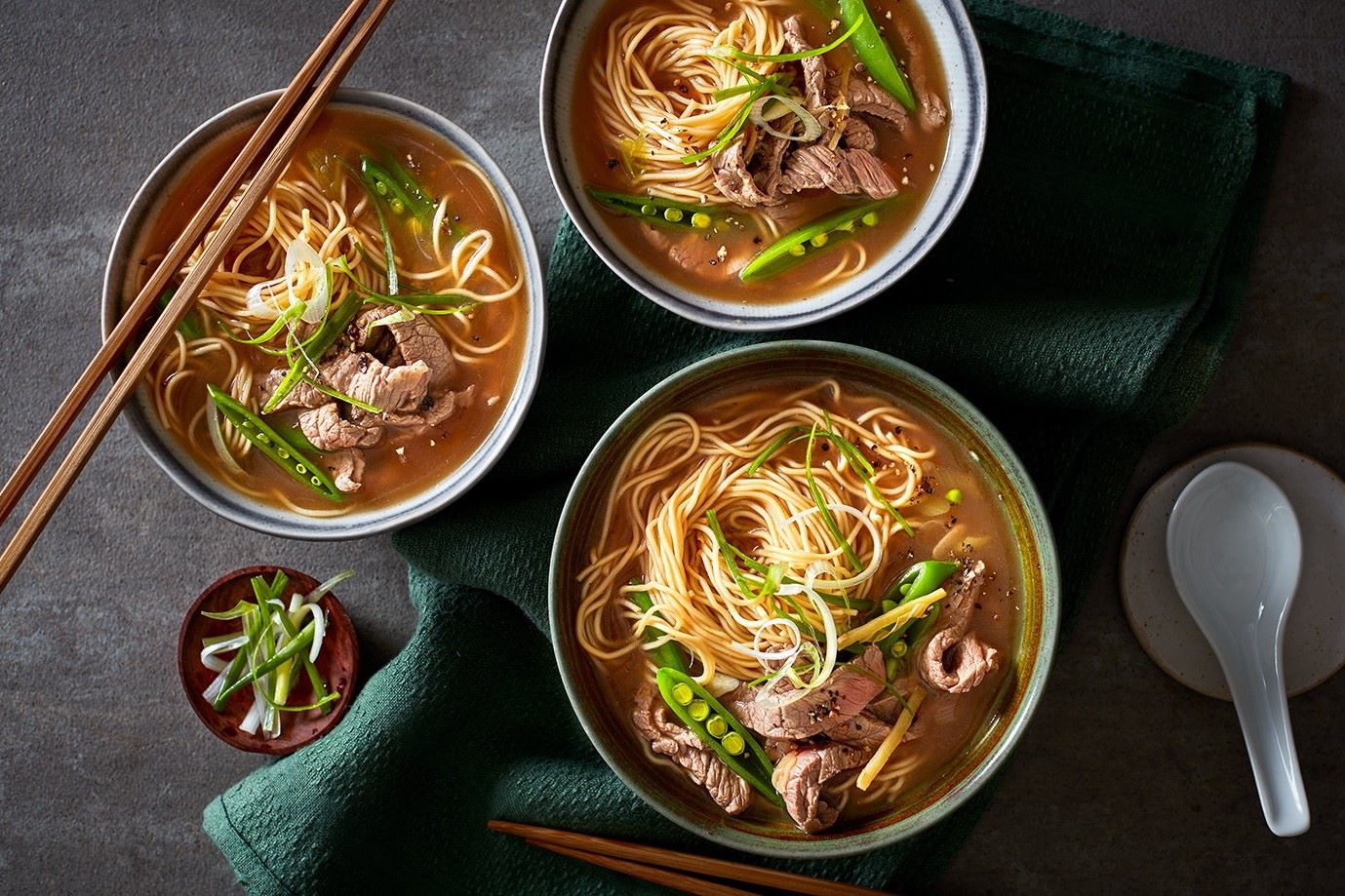
Beef ramen has become a beloved dish for food enthusiasts and comfort food lovers alike. This hearty and flavorful noodle soup, packed with tender beef slices and a rich broth, has gained popularity around the world. But besides being delicious and satisfying, it’s essential to understand the nutritional value of this popular dish.
In this article, we will delve into the nutrition facts of beef ramen and explore the benefits it offers. From the protein content of beef to the vitamins and minerals found in the broth and accompanying ingredients, we will uncover what makes beef ramen a well-rounded meal option. So, whether you’re a ramen aficionado looking to learn more about the nutritional aspects or someone interested in incorporating this dish into your diet, you’ve come to the right place.
Key Takeaways:
- Beef ramen is high in calories, fat, and sodium, but it also provides a good amount of protein and iron. It’s a tasty treat, but should be enjoyed in moderation.
- While beef ramen is low in fiber and some vitamins, it can still contribute to your daily nutrient intake. Pair it with veggies and lean protein for a balanced meal.
Calories
One serving of beef ramen contains approximately 380 calories.
Carbohydrates
A single serving of beef ramen contains around 52 grams of carbohydrates.
Protein
Beef ramen is a good source of protein, with approximately 9 grams per serving.
Fat
Beef ramen contains approximately 14 grams of fat, with most of it being saturated fat.
Sodium
One serving of beef ramen can have up to 1,400 milligrams of sodium, which is more than half of the daily recommended intake.
Fiber
Beef ramen is low in fiber, with only 2 grams per serving.
Vitamin C
One serving of beef ramen provides a small amount of vitamin C, contributing to your daily needs.
Iron
Beef ramen is a good source of iron, with around 2.5 milligrams per serving.
Calcium
One serving of beef ramen contains a small amount of calcium, contributing to your daily intake.
Potassium
Beef ramen is relatively low in potassium, with approximately 210 milligrams per serving.
Vitamin B6
One serving of beef ramen provides a small amount of vitamin B
Magnesium
Beef ramen contains around 34 milligrams of magnesium per serving.
Zinc
One serving of beef ramen provides a small amount of zinc.
Vitamin A
Beef ramen is low in vitamin A, with only a small amount per serving.
Phosphorus
One serving of beef ramen contains a moderate amount of phosphorus.
Niacin
Beef ramen provides a small amount of niacin, contributing to your daily needs.
Riboflavin
One serving of beef ramen contains a small amount of riboflavin.
Thiamin
Beef ramen is a source of thiamin, with around 0.2 milligrams per serving.
Conclusion
In conclusion, beef ramen is not only a delicious and satisfying meal, but it also offers various nutritional benefits. With its rich protein content, essential vitamins and minerals, and low levels of fat and calories, beef ramen can be a nutritious option for those looking to maintain a balanced diet.However, it’s important to note that while beef ramen can be a part of a healthy diet, moderation is key. It’s always recommended to pair your beef ramen with a variety of vegetables and make sure to consume it in appropriate portion sizes.So the next time you’re craving a warm and comforting bowl of beef ramen, you can enjoy it knowing that it can provide you with both mouthwatering flavor and valuable nutrients.
FAQs
1. Is beef ramen high in calories?
Beef ramen typically contains around 300-400 calories per serving, making it a moderate calorie option. However, it’s important to be mindful of portion sizes and any additional ingredients you may add, as they can contribute to the overall calorie content.
2. Does beef ramen provide any nutritional benefits?
Yes, beef ramen offers several nutritional benefits. It is a good source of protein, which is essential for muscle growth and repair. It also provides important vitamins and minerals such as iron and B vitamins.
3. Is beef ramen high in fat?
Beef ramen can vary in fat content depending on the type and brand. Generally, it contains a moderate amount of fat. Opting for low-fat or reduced-sodium versions can help reduce the fat content.
4. Can beef ramen be a part of a balanced diet?
Absolutely! Beef ramen can be enjoyed as part of a balanced diet, particularly when paired with vegetables and consumed in moderation. It’s important to remember that variety and portion control are key to maintaining a healthy eating pattern.
5. Are there any healthier alternatives to traditional beef ramen?
If you’re looking for a healthier alternative, you can consider making your own beef ramen at home using nutrient-rich ingredients, such as whole wheat noodles, lean cuts of beef, and an array of colorful vegetables. This allows you to have greater control over the ingredients and customize the dish according to your preferences.
Was this page helpful?
Our commitment to delivering trustworthy and engaging content is at the heart of what we do. Each fact on our site is contributed by real users like you, bringing a wealth of diverse insights and information. To ensure the highest standards of accuracy and reliability, our dedicated editors meticulously review each submission. This process guarantees that the facts we share are not only fascinating but also credible. Trust in our commitment to quality and authenticity as you explore and learn with us.


